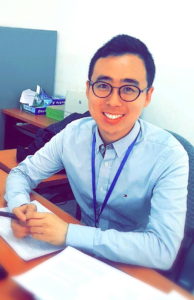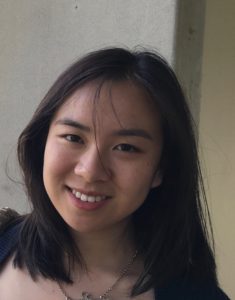In spring 2018, CAP is hosting a Lunch Series featuring our CAP Graduate Program Participants: Ha Ryong Jung (Michael), Harvard Law School J.D. Candidate; Fiona Lin, Harvard Law School LL.M. Candidate; and Emily Davies, Harvard College Senior. During the talks, each participant will present his or her research findings, and attendees will have the opportunity to provide feedback and suggestions. Lunch will be provided.
If you would like to attend one or more of the Lunch Series talks, please RSVP here to ensure that we have enough food available.
Upcoming lunches are:
- Monday, February 26, 2018
- Monday, March 5, 2018
- Monday, March 19, 2018
Contact CAP Visiting Researchers and Scholars Program Coordinator Mary Welstead, [email protected], with questions.
Promising Child Protection Model of Friends-International in Cambodia
 Discussion with Ha Ryong Jung (Michael), Harvard Law School J.D. Candidate, Class of 2018
Discussion with Ha Ryong Jung (Michael), Harvard Law School J.D. Candidate, Class of 2018
Monday, February 26, 2018
12:00 – 1:00 PM
23 Everett Street
CAP Suite, G-24
Harvard Law School
Paper Topic: Friends-International provides a promising model of a community-based child protection mechanism (CBCPM) that can serve as an example for other organizations around the world. There is no perfect one-size-fits-all type of CBCPM, as they vary in terms of the target scope of issues, geographical reach, range of beneficiaries and other participants, and extent of interagency collaboration, for example. Each mechanism must be shaped according to the context and needs of the locality, but there are overarching core frameworks and innovations that can inform CBCPMs both in their early start-up and subsequent developmental phases. In this regard, the model of Friends is notable and can provide insightful guidance, especially in an era where CBCPMs are gaining more popularity in their ability to effectively and efficiently address the myriad of concerns being faced by children. This case study inquires into the contributors of Friends’ success.
Biography: Ha Ryong Jung (Michael) is a 3L at Harvard Law School from South Korea, who focuses on international children’s rights and child protection, particularly on issues of justice for children in Southeast Asia. His current interests encompass the promotion and enhancement of juvenile justice reform and child-sensitive procedures for children in contact with the law, especially pertaining to those deprived of liberty. Since entering law school, he has worked on children’s issues in the UN System, NGOs, clinics, a government agency, and courts in multiple countries including Cambodia, Thailand, Myanmar, and the US. He also has experience in the broader framework of human rights, as well as international criminal law and humanitarian law. Upon graduation, he plans to return to Southeast Asia to continue upholding the rights of children and ensuring their protection.
The Implications of Trinity Lutheran Church of Columbia v. Comer: Is it Constitutional to Exclude Religious Schools from School Voucher Programs?
 Discussion with Fiona Lin, Harvard Law School LL.M. Candidate
Discussion with Fiona Lin, Harvard Law School LL.M. Candidate
Monday, March 5, 2018
12:00 – 1:00 PM
23 Everett Street
CAP Suite, G-24
Harvard Law School
Paper Topic: In June 2017, the US Supreme Court determined that the Missouri government could not exclude a religious daycare center from receiving grants to change playground surfaces to rubber made from recycled tires. On the one hand, this appears to be a narrow case about the desirability of supporting the prevention of scraped knees. On the other hand, this case could be read to support the general principle that the Free Exercise Clause of the First Amendment requires – not just permits, under the Establishment Clause (Zelman v. Simmons-Harris) – the inclusion of religious schools within state funding and school choice programs. Trinity Lutheran Church highlights multiple tensions in contemporary US law and politics: between the Free Exercise and Establishment Clauses, neutrality and separatism, and federal and state power. I plan to explore how far this recent Supreme Court case might be used by school choice and religious activists to consolidate the position of religious schools within school voucher programs, and the policy implications of a principle of mandatory inclusion.
Biography: Fiona Lin is currently studying for an LL.M. at Harvard Law School. She studied law at Queens’ College, University of Cambridge, completing a dissertation about the implications of privatization for the judicial review of schools in England. As well as taking classes on education law and policy, she has taken courses regarding issues of gender and family, and constitutional law. Beyond the academic perspective, Fiona is interested in understanding the practical issues affecting teaching and learning, and has volunteered in local Cambridge schools.
Longitudinal Outcomes of Former Foster Care Youth
 Discussion with Emily Davies, Harvard College, Class of 2018
Discussion with Emily Davies, Harvard College, Class of 2018
Paper Topic: This paper analyzes the longitudinal outcomes for former foster care youth, comparing criminality rates (including juvenile delinquency) and secondary school educational attainment of three main groups: those adopted, those reunified with their families, and those who experienced long-term foster care placements until the age of adulthood. Controlled regressions show a statistically significant yet small effect that those who are adopted are less likely to be criminals or juvenile delinquents than their reunified peers. However, those placed in long-term foster care placements experience worse adult criminality than both their adopted and reunified peers.
Biography: Emily Davies is a Senior at Harvard College concentrating in Economics with a secondary in Ethnicity, Migration, and Rights. She focuses on international development and is especially passionate about child welfare. Emily’s commitment to this work is rooted in both her personal background as an international adoptee and her experiences volunteering with disadvantaged children both domestically and abroad. In the future she hopes to address these issues professionally.
